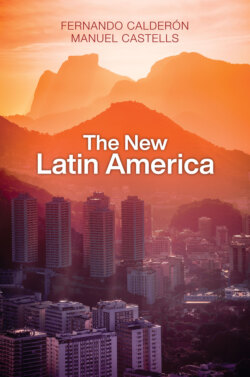Читать книгу The New Latin America - Manuel Castells - Страница 24
The Environmental Limits of Informational Extractivism
ОглавлениеThe transition from industrial to informational extractivism has involved the formation of a new field of historical conflict between informational corporations, on the one hand, and, on the other, globalized – and networked – territorial actors. This involves a passage from the working class formed under industrial extractivism to a range of territorial actors operating under informational extractivism. This means a working class that is organized and integrated through functional differentiation; these workers form territorial organizations of various kinds: communitarian organizations, local associations, and organizations formed on the internet that bring together people with shared opinions.
We also see the emergence of various kinds of informational corporations with various internal structures and relationships to other companies. These corporations put information to different technological and economic uses, and they participate in different kinds of global networks. This leads to the emergence of institutions, subjectivities, and social organizations that play different roles in conflicts. That is, we also see the emergence of various social and territorial organizations, technological economies, and global networks.
All of this implies a new relationship between structural reality and subjectivity, or the possibilities and capacities of informational agents. The categories of isolated masses or modern, industrial unions, which were key to explaining industrial extractivism, are obsolete or have become subordinate to new forms created by the technological economy of information and new social networks of power.
On the ground, the effects on local societies vary, and the results range from integration to conflict, distrust, and the fragmentation of communities. In Carlos Casares, for example, we find an integrated society; in Vaca Muerta, we find a society that is somewhat integrated but also marked by conflicts; and in Salar de Olaroz, such conflicts have led to community fragmentation and distrust, in a social context with little integration and a great deal of potential for further conflict. A key factor in all of these contexts is the presence of a form of extractivism that degrades the environment but at the same time provides resources for policies that promote social integration and the diversification of production or the strengthening of the market. All of this leads to changes in and redefinitions of territorial boundaries in a new informational context. This also means economies and cultures that are altered by networks. Here both real and virtual borders of extraction change in different ways. The nation-state is insufficient in such a context and has increasing difficulty dealing with these kinds of changes.
The examples that we have considered in this chapter reflect the multicultural dynamics of Latin America, where a “new communitarianism” has emerged, one that is also ecological and that is marked by these basic traits: the defense of land, the recognition of various social and environmental demands, the critique of the model of development that we have called informational extractivism, and, above all, a communitarian cultural tendency that opposes environmental despoliation and seeks to valorize forms of life based on ecological thought.
